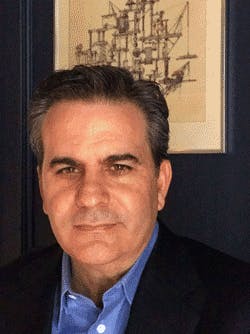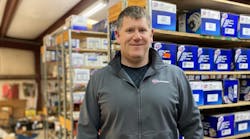Headquartered in Cuernavaca, Mexico with a U.S. office in Dallas, Intran is a contract manufacturer of automotive components.
“My grandfather founded our company in 1969, primarily to serve OEM assembly plants in Mexico. His first customer was American Motors, and from there business was won at Chrysler, General Motors, Ford, Nissan and Volkswagen,” says CEO Juan Cintrón.
“Starting in the 1990s, we made a big effort to knock on doors and develop our products within the fuel tank and fuel pump industries by opening a sales office in the United States. Over the last 25 years we have developed over 800 part numbers for the aftermarket within the fuel systems industry, and our customers also gave us many other opportunities to develop other components as we were successful in the products we initially developed. Currently, we have over 2,000 part numbers of one kind or another.”
These “opportunities earned” led the company to introduce wire harnesses, molding and over-molding harnesses, contract brazing, stamping, tube bending, end forming, machining, wire forming, vacuum impregnation and small part assemblies to the product mix. Aftermarket firms and OEMs alike now form the current customer base.
“That business is attractive again since we do have costs that make us competitive and know-how that our U.S., European, and Japanese customers require,” says Cintrón, who recently answered a series of questions posed by Aftermarket Business World:
Q: Given the comments and actions of President Donald Trump regarding automotive imports from Mexico, how do you see the outsourcing-to-Mexico prospects of American auto parts manufacturers changing under the Trump administration?
A: It may diminish, but it also could increase under the right renegotiation of NAFTA (the North American Free Trade Agreement). It seems to us that Mexico and the U.S. have too much to lose by not creating a constructive framework; it seems that there may be a greater willingness to listen on the U.S. side.
Mexico, the United States and Canada can form a “Powerful North American Engine of Prosperity,” as Peter Navarro said amidst the cancellation of the meeting with President Trump by Mexican President Enrique Peña Nieto. I suspect Navarro, as one of Trump’s trade advisors, has a strategy that will enable this. If so, it will be great for the American, Mexican and Canadian worker. This would benefit not only auto parts but all products, goods and services traded. It is no understatement that the Mexican-American relationship is at a low point and in need of repair.
Q: What do you see happening if the terms to NAFTA are renegotiated?
A: My expectation is that there will be changes in the origin of raw materials and the percentage of these that will have to be used within the three countries. That would be positive in the long term for all countries. I tend not to take the negative view on these things since it serves no purpose.
We have to continue to reduce our costs and expand our markets within the United States, within Mexico, and in other parts of the world. We hope that it is renegotiated in a way that it doesn’t make our parts or American parts more expensive. We do source from other countries, like all auto parts manufacturers do, and when restrictions get implemented the result may be increased cost to the consumer.
All in all, I would expect that there would be a clarification of rules for many sectors and the incorporation of other sectors that were not contemplated in the original 1994 agreement.
Q: What are some of the main categories of auto parts being manufactured in Mexico?
A: All categories are being made in Mexico, but electronic and electrical components, engine components, and engines, wire assemblies, filtration and fuel systems components are the main categories.
Q: Are these mostly labor-intensive components, or are other more sophisticated products produced there?
A: It varies, but at the Tier 1 and 2 levels there are plants in Mexico with little labor and a lot of automation, just as in the United States. Automation is what has caused the most impact in terms of the number of jobs available in the U.S. and Mexico. As an example, we have reduced our labor force through automation by 20 percent over the last two years.
Unfortunately, to remain competitive in this world it is a necessity and a requirement from a repeatability stand point. We try and grow other opportunities within our company in order to keep our good labor force since Mexico needs jobs.
The worst thing that can happen is for trade to stop flowing between the United States and Mexico, because there will be more people wanting to cross the border looking for opportunities. That would have the exact opposite effect desired by President Trump, and jobs would be lost in the United States.
We build many components in Mexico for the aerospace industry, which is highly sophisticated, and in Mexico this industry has found not only the workforce but the engineering power to produce these high-value parts.
Q: How do Mexico’s labor costs compare to other nations, such as China?
A: Our labor costs are close to China’s, depending on how you measure it. We are more stable in labor costs today, and China’s labor costs are rising. However, labor is not the only cost driver for any component. Logistics, proximity to the market, and appreciating the needs of our American and Canadian customers are other important factors. We have been successful, not due to our labor costs, but because we look to create value for our customers, deliver their needs on time and make quality our main driver.
Q: Are there logistical advantages to manufacturing products in Mexico?
A: Absolutely. We are much closer to the United States than China. Freight is less per unit in our category, and this proximity also gives us the advantage to visit our customers if they have a specific need and be there the same day if required. Our customers can also visit us the same day. We are a two- to four-hour flight from most parts of the United States, compared to being 14-plus hours away from China.
We are also able to handle reduced inventories. We can ship with one- to 20-day lead times, and we will build inventory buffers for a week. With China, you need to handle two to three months’ worth of inventories.
Q: Do American firms face challenges relating to customs regulations, etc. in getting their purchased products across the border?
A: Not in our experience. The border crossings these days are very routine and smooth. I have been doing this for a long time. Twenty-five years ago, it was a problem.
There may be a hiccup or two every now and then, but 99 percent of the time our shipments go through the crossing without an issue, and the same goes for materials we import from the U.S.
Q: What are some other key advantages obtained by manufacturing auto parts in Mexico?
A: A good base of engineers – a bilingual team in our case – and proximity to the United States, where we buy up to 40 percent of our components. If you think about it, we are actually helping provide jobs in the United States much more than other countries do. In that sense, we were the first country to say, “America first!” We always look to the United States first to find raw materials, equipment and expertise, as do so many other Mexican manufacturers.
Q: What are some questions that American executives should be asking before contracting to manufacture in Mexico?
A: If they are making a choice between contracting in Mexico and China, for example, I would look at closeness to the market, stable labor force and a good engineering base.
They should also consider the local manufacturing quality standards. We are ISO-TS16949 and ISO 9001-2008 quality certified. You also need to consider the legal and financial strength of the company, who are their local suppliers, the quality of their management team, and their ability to meet commitments.
Q: What are some key points to consider if an American company is thinking of building a factory in Mexico?
Finding the right partner is key. Just as I would look for someone with experience to open a factory in the United States, someone who would know the labor laws, regulations and general business customs, the same should apply for U.S. companies doing business in Mexico. We have had many successful partnerships over the years with U.S. companies, and they are built on honesty, trust and a shared set of values.
Subscribe to Aftermarket Business World and receive articles like this every month….absolutely free. Click here.


